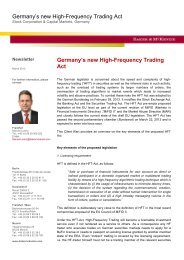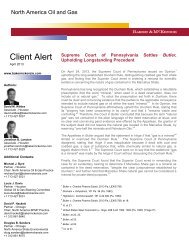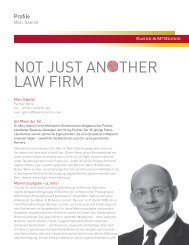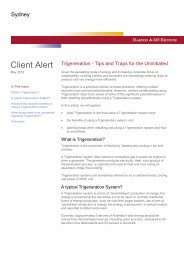Read publication - Baker & McKenzie
Read publication - Baker & McKenzie
Read publication - Baker & McKenzie
Create successful ePaper yourself
Turn your PDF publications into a flip-book with our unique Google optimized e-Paper software.
Canada<br />
agreements. 5 Most of the underlying provincial regimes parallel or expressly incorporate<br />
large portions of Canada’s federal tax laws, including the Act’s sophisticated system of<br />
administrative objections and judicial appeals. Despite this formal structure, taxpayers<br />
are often able to resolve disputes through less formal negotiations with the CRA in the<br />
course of tax audits or through pre-emptive measures taken before the commencement<br />
of any formal audit. Although the majority of tax disputes are resolved at these earlier<br />
stages, traditional tax litigation remains prevalent in Canada and large numbers of tax<br />
disputes are decided in court.<br />
When planning for potential litigation, taxpayers must weigh the benefits of the<br />
court process against its inherent uncertainties, and the investment of time and resources<br />
required to mount a proper judicial appeal. Current trends suggest that growth areas for<br />
civil tax litigation in Canada include anti-avoidance matters, transfer pricing issues, interjurisdictional<br />
tax planning, and the classification of novel types of receipts or deductions<br />
(such as the tax treatment of contractual break fees or hybrid financing arrangements).<br />
These areas tend to involve unsettled legal questions and fact-intensive scenarios with<br />
greater potential litigation gains than those with developed bodies of jurisprudence.<br />
Compared to civil tax disputes, criminal tax litigation in Canada is quite rare.<br />
Criminal tax prosecutions arise most often in relation to tax evasion, fraudulent benefit<br />
claims, deceitful misrepresentation, or the failure to provide information or returns to<br />
the CRA. Criminal tax offences incorporate concepts of intentional wrongdoing (i.e.,<br />
both an actus reus and a mens rea). They are punishable by significant penalties, including<br />
fines and potential imprisonment, designed to redress the wrongs done to society at large<br />
rather than to the raising of public revenues. Short of meeting the criminal threshold,<br />
Canadian tax authorities may also apply a wide assortment of regulatory or civil penalties<br />
for improper taxpayer conduct.<br />
II<br />
COMMENCING DISPUTES<br />
i Civil tax disputes<br />
The formal process for resolving civil tax disputes commences after the CRA or a<br />
provincial tax authority issues written notification that it has assessed a taxpayer<br />
– typically by way of a ‘notice of assessment’. That notice identifies the amount of a<br />
taxpayer’s liability under a particular tax statute or statutes. In the normal course of<br />
events, the underlying assessment is made following an examination of tax returns and<br />
5 The CRA currently administers all personal income taxes in each of Canada’s three territories and<br />
in nine of its 10 provinces – Quebec being the single exception. Similarly, the CRA administers<br />
both federal and provincial corporate income taxes in all provinces except Quebec and Alberta.<br />
Ontario, Canada’s most populous province, only joined the tax collection agreement scheme<br />
for corporate income taxes in 2009. Ontario corporate income taxes for taxation years ending<br />
before 1 January 2009 continue to be administered under the prior provincial tax system and<br />
dispute resolution structure.<br />
23
















